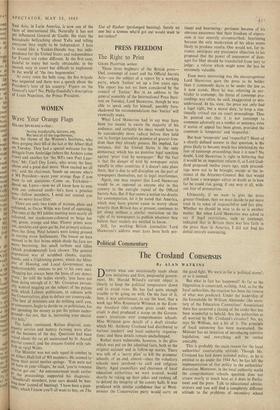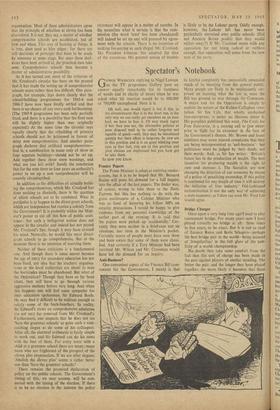Political Commentary
The Crosland Consensus
By ALAN WATKINS
DESPITE what one occasionally reads about new initiatives and firm, purposeful govern- ment, Mr. Harold Wilson's current object is clearly to keep the political temperature down and to avoid rows. He has had quite enough trouble to• be going on with. On the face of it, then, it was unfortunate, to say the least, that a week ago Miss Rosemarie Wittman in the Even- ing Standard (this column gives credit where credit is due) produced a scoop on the Govern- ment's intentions over comprehensive schools. Miss Wittman gave details of a draft circular which Mr. Anthony Crosland had distributed to various teachers' and local authority organisa- tions; and these details remain unchallenged.
Rather more vulnerable, however, is the gloss which was put on the admitted facts, both in the original account and in follow-up stories. There was talk of a `secret plan' to kill the grammar schools; of an end, almost—since the voluntary schools were involved—to civil and religious liberty. Aged councillors and chairmen of local education authorities, we were assured, would shortly be taking up their pikes and rushing off to defend' the integrity of the county halls. It was predicted with similar confidence that at West- minster the Conservative party would carry on the good fight. We were in for a `political storm'; or so it seemed.
But what in fact has happened? As far as the Opposition is concerned, nothing. And, as for the local authorities, the reaction has been the reverse of what was predicted. Under the leadership of the formidable Sir William Alexander (the secre- tary of the Education Committees' Association) there has occurred a closing of the ranks that has been wonderful to behold. Are the authorities at all worried by Mr. Crosland's circular? No, no, says Sir William,. not a bit of it. The principle of local autonomy has been maintained, the Minister has no intention of introducing coercive legislation, and everything will be settled amicably.
This is probably the main reason for the local authorities' comfortable attitude. Though Mr. Crosland has laid down national policy, as he is entitled to do under the 1944 Act, he has left the, implementation of that policy to the authorities' discretion. Moreover, in the local authority world the comprehensive schools question does not arouse nearly as much heat as it does in Parlia- ment and the press. Talk to educational admini- strators and you will find a completely different attitude to the problems of secondary school
organisation. Most of these administrators agree that the principle of selection at eleven has been discredited. It is not, they say, a matter of whether comprehensive schools are established, but of how and when. This way of looking at things, it is true, does tend to blur edges: for there are still decisions of principle that have to be made by someone at some stage. But once these deci- sions have been arrived at, the 'practical men take over. Comprehensive schools then become a matter of administrative possibility.
As it has turned out, most of the criticism of Mr. Crosland's circular has been on the ground that it has made the setting up of comprehensive schools more rather than less difficult. One para- graph, for example, lays down clearly that the school-building programmes for 1965-6 and 1966-7 have now been finally settled and that there is no chance of any extra cash forthcoming. (The 1967-8 programme has been only partially fixed, and there is a possibility that the final sum will be slightly higher than was originally expected.) At the same time the circular says equally clearly that the rebuilding of primary schools should not be jettisoned in favour of shiny new comprehensives. And another para- graph declares that artificial comprehensives— that is, a combination in name only of three or four separate buildings—should not be set up. Add together these three stern warnings, and what are you left with? Surely the conclusion that for the next three or four years an authority's power to set up a new comprehensive will be severely circumscribed.
In addition to the difficulties of actually build- ing the comprehensives, which Mr. Crosland has done nothing to diminish, there is the question of which schools are to be combined. What in particular is to happen to the direct-grant schools, which are independent but receive a subsidy from the Government? It is probably within the Mini- ster's power to cut off this flow of public assis- tance: but such a belligerent notion does not appear in the circular and indeed has not passed Mr. Crosland's lips, though it may have crossed his mind. Naturally, he would like most direct- grant schools to go comprehensive. But at the moment there is no intention of coercing them.
Neither of these criticisms is a fundamental one. And though there is some unrest because the age of entry for secondary education has not been fixed, any idea that the teachers' organisa- tions or the local authorities arc about to man the barricades must be abandoned. But what of the Opposition? Though they have so far been silent, they will have to go through various aggressive motions before very long. And when this happens one will feel some sympathy for their education spokesman, Sir Edward Boyle. lie may find it difficult to be militant enough to satisfy some of the back-benchers. In reality, Sir Edward's views on comprehensive education are not very far removed from Mr. Crosland's. Furthermore, one suspects that he does not see 'Save the grammar schools' as quite such a vote- catching slogan as do some of his colleagues. After all, the electoral arithmetic is fairly simple to work out, and Sir Edward can do his sums with the best of therm For every voter with a child at a grammar school there are many, many more who arc frightened of the prospect of the eleven plus examination. If we are after slogans, `Abolish the eleven plus' seems a rather better one than 'Save the grammar schools.'
There remains the promised declaration of policy on the public schools. The Government's timing of this, we may assume, will be con- nected with the timing of the election. If there is to be no election in the autumn the policy statement will appear in a matter of months. In the meantime what is certain is that the com- mission (the word 'trust' has been abandoned) will indeed be set up and will proceed by agree- ment with the schools. There is no intention of making fee-paying as such illegal. Mr. Crosland, like President Johnson, has adopted the idea of the consensus. His greatest source of trouble is likely to be the Labour party. Oddly enough. however, the Labour left has never been particularly exercised over public schools. (Did not Aneurin Bevan predict that they would wither away?) If Mr. Crosland meets with any opposition for not being radical or ruthless enough, that opposition will come from the new men of the party.



































 Previous page
Previous page